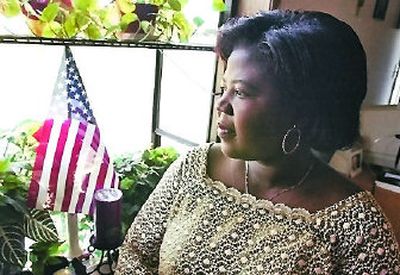‘I am very fortunate’

Born and raised in a poor village of Ghana, Africa, Elizabeth Kakraba lived with little promise of a future.
After winning a diversity lottery visa, and moving to Spokane in 2004, Kakraba’s perspective shifted from simply surviving to dreams of making a difference
“Coming here inspires me to do something,” Kakraba said. “Back home, children die because there is no pharmacy, no clinics and no health care.”
The catalyst that sparked Kakraba’s passion to help her village was losing her younger sister to stomach complications while traveling to the United States.
“My sister died on Sunday, and I called Tuesday morning,” Kakraba recalled. “Since then I want to work hard and hope to make enough money to build a small clinic.”
Kakraba was raised on a vegetable farm with eight brothers and sisters in a two-bedroom home. Her father slept in one room while her mother shared the other with all nine children.
“We had one mattress we all slept on,” remembers Kakraba. “One blanket for all of us. Looking back that is no good.”
Their farm produced enough food for the family but not enough to sell for modern conveniences such as running water and electricity.
Kakraba remembers having no toys to play with as a child. Her mom would clean out a tomato can, smooth out the edges, and give it to Kakraba and her siblings to play with.
“When I go back home to visit my suitcase is going to be filled with toys,” Kakraba said. “In my village, children don’t have what they need.”
At age 16, she took a sewing course and tried to earn a living being a seamstress. When that did not go as planned, she moved to the bordering country of Togo and secured a housekeeping job with a Canadian couple.
Afterward, when the couple returned to Canada, she went to work as a housekeeper for an American woman, Geri Branch.
Branch, who had previously been the principal at Spokane Valley’s Broadway Elementary, was the principal for the American International School of Lome in Togo. Kakraba worked three years for Branch before winning the visa lottery.
“I forgot about it,” Kakraba recalled about hearing she won, after a six-month lapse between then and the time she applied. “The day they brought me the envelope was the biggest thing that ever happened to me.”
The diversity lottery visa is a program administered by the U.S. State Department as part of the Immigration Act of 1990. For the past 17 years, the Diversity Immigrant Program makes available 50,000 permanent resident visas annually from countries with low immigration rates.
“I am very fortunate,” said Kakraba on winning with her first application. “Many people try every year and never win.”
The process of using the visa involved extensive paperwork and a comprehensive medical exam. She had to wait another 1 1/2 years for the visa to arrive.
“Geri asked if Elizabeth could come live with me,” said Alia Simonson, Kakraba’s Spokane sponsor. Simonson, originally from the Spokane Valley, met Kakraba while working for Branch at the Institute. Simonson fulfilled Kakraba’s need to have a sponsor in America, a pre-requisite for her visa to be accepted.
“Geri thought since I come from a close knit family similar to a family in Africa it would be easier for her.”
Kakraba left her husband Kokou Luc “Luc” Koffi-Gue in Africa temporarily. They lived apart for four months until she secured a job and an apartment.
“That was hard,” Kakraba said. “But if you look forward to something better, you take a chance and do it.”
Her arrival in Spokane in September 2004 brought an emotional reunion with Simonson.
“I never thought I would see her again,” Simonson said. “When I saw them pull into my sister’s driveway, I ran out and we just hugged.”
Kakraba faced many challenges. From adjusting to temperature changes to enduring culture shock, Kakraba’s world turned upside down.
“It is very traditional roles in the African culture,” Simonson said. “Little things like my brother-in-law offering to clear her plate was something that a man wouldn’t do in Africa. Her eyes would get big and she would be amazed.”
“The thing that shocked me the most was not knowing your neighbor,” Kakraba said. “Back home people are very friendly. My mom would wake up every morning and check her friends. It’s very different.”
Kakraba landed her first job at Orchard Crest as a part-time housekeeper. After one week, she became a full-time employee. After taking classes, she worked her way up to being a full-time caregiver. Eventually she wants to study to become a nurse.
Being the oldest, and keeping the African tradition, Kakraba supports her family financially. With Kakraba’s support, her family was able to pay for electricity and a television last year.
“My parents are very happy and proud of me,” Kakraba said. “Right now they would tell you I’m the only girl that made it to America. It’s a big thing for them.”
“Elizabeth is a very brave woman,” Simonson said. “She is so excited and proud to be able to do this for her family.”
“My world has totally opened up,” Kakraba said. “There is a lot of opportunity (in America) to be anything you want to be. I want to work hard here so I can help my village. There is a lot of work to do.”